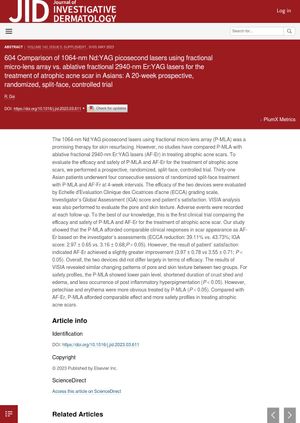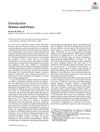Comparison of 1064-nm Nd:YAG Picosecond Lasers Using Fractional Micro-Lens Array vs. Ablative Fractional 2940-nm Er:YAG Lasers for the Treatment of Atrophic Acne Scar in Asians: A 20-Week Prospective, Randomized, Split-Face, Controlled Trial
April 2023
in “
Journal of Investigative Dermatology
”
1064-nm Nd:YAG picosecond lasers fractional micro-lens array ablative fractional 2940-nm Er:YAG lasers atrophic acne scars ECCA reduction scores Investigator’s Global Assessment VISIA analysis post-inflammatory hyperpigmentation petechiae erythema Nd:YAG laser Er:YAG laser acne scars IGA scores hyperpigmentation red spots skin redness

TLDR Both laser treatments improved acne scars similarly, but the Nd:YAG laser was safer and less painful, while the Er:YAG laser left patients slightly more satisfied.
In a 20-week prospective, randomized, split-face, controlled trial involving 31 Asian patients with atrophic acne scars, the 1064-nm Nd:YAG picosecond lasers using fractional micro-lens array (P-MLA) was compared to ablative fractional 2940-nm Er:YAG lasers (AF-Er). The study found that both treatments provided comparable clinical responses in scar appearance, with ECCA reduction scores of 39.11% for P-MLA and 43.73% for AF-Er, and similar Investigator’s Global Assessment (IGA) scores. However, patient satisfaction was slightly higher with AF-Er (3.97 ± 0.78 vs 3.55 ± 0.71; P<0.05). VISIA analysis showed similar changes in pore and skin texture for both treatments. In terms of safety, P-MLA resulted in lower pain levels, shorter duration of crust shed and edema, and less post-inflammatory hyperpigmentation, but more petechiae and erythema. Overall, P-MLA offered a comparable effect and more safety profiles in treating atrophic acne scars compared to AF-Er.





